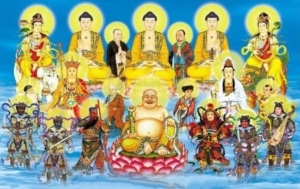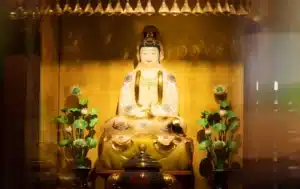The Cundi Bodhisattva mantra is a powerful tool for spiritual practice and transformation, offering a way to connect with the divine qualities of compassion, wisdom, and protection embodied by this revered Bodhisattva.
With its roots in Mahayana Buddhism and its widespread use in Vajrayana Buddhism, as well as in Chinese and Japanese Esoteric Buddhism, the Cundi mantra has become a beloved and effective method for those seeking to overcome obstacles, cultivate inner peace, and achieve spiritual liberation.
In this mantra, we find a profound expression of the universal truths and sacred energies that underlie all spiritual traditions, and a roadmap for navigating the challenges and opportunities of life with grace, clarity, and purpose.
Who is Cundi Bodhisattva in Buddhism?

Cundi Bodhisattva is a highly venerated figure in Mahayana Buddhism and is also known as Bhagavati, the Mother of Buddhas and a goddess in Hinduism. In China, she is equated with Guanyin Bodhisattva, who tirelessly listens to the prayers of sentient beings and works to help those who call upon their name.
Known as Zhunti in China and Juntei in Japan, Cundi Bodhisattva is particularly revered in the Vajrayana Buddhist schools and is a frequent character in Garbha-dhatu and the object of meditation. She is often depicted with 18 arms and 3 eyes, each holding a treasure representing the skillful means (upayas) of the Dharma.
According to legend, Cundi Bodhisattva was guarded by two dragon kings, Nanda and Upananda. The chanting of Cundi mantra is prevalent throughout East Asia and Tibetan Buddhism, with Buddhists reciting the Chun Ti Shen Chou or Cundi Dharani in Sanskrit to request the assistance of Bodhisattvas in fulfilling their wishes. These prayers can be for career success, marital harmony, relationships, and academic achievement.
In addition to her other attributes, Cundi Bodhisattva is believed to have the ability to bestow blessings, remove obstacles, and safeguard practitioners from harm. Those who wish to cultivate wisdom and compassion, overcome obstacles, or attain spiritual liberation often undertake her practice.
Symbolic meaning

Cundi Bodhisattva is typically depicted as a female deity with multiple arms and eyes. Her appearance can vary somewhat depending on the cultural context and artistic tradition, but there are some common features that are often associated with her:
- Multiple arms: Cundi Bodhisattva is often depicted with eighteen or twenty-four arms, each holding a different symbolic object or hand gesture (mudra).
- Multiple eyes: Cundi Bodhisattva is sometimes depicted with three or more eyes, symbolizing her ability to see all things and all beings, and to have great insight and wisdom.
- Crown or headdress: Cundi Bodhisattva is often shown wearing an elaborate crown or headdress, sometimes adorned with jewels or symbolic objects.
- Lotus flower: Cundi Bodhisattva is frequently depicted seated on a lotus flower, which symbolizes purity, spiritual growth, and the ability to rise above worldly distractions.
- Jewel or staff: Cundi Bodhisattva is often shown holding a jewel or a staff with three jewels, which represent her power to dispel obstacles and grant wishes.
- Serpents: Cundi Bodhisattva is sometimes depicted with serpents or dragons, which represent her ability to overcome obstacles and protect practitioners.
Overall, the symbolic meaning of Cundi Bodhisattva emphasizes the importance of beauty, compassion, protection, wisdom, skillful means, motherly love, and feminine power in the spiritual path. Practitioners seek to cultivate these qualities in themselves through the practice of Cundi Bodhisattva’s teachings and mantras.
The Meaning of Cundi Bodhisattva mantra
Once, the Buddha was meditating in the Anathapindika garden of the Jetavana forest near the city of Sravasti. At that time, he contemplated and observed the future of sentient beings. With great compassion for them, the Buddha decided to describe the Cundi Dharani Sutra, the mother’s heart, in the Buddha Kotis. Thus, the Buddha revealed the mantra:
Mantra Sanskrit version:
Namaḥ Saptānāṃ Samyaksaṃ Buddha Koṭīnāṃ Tadyathā: Oṃ Cale Cule Cunde Svāhā – Om Cale Cule Cundi Soha
- Namaḥ: I take refuge in the Mother of Buddhas
- Saptānām: Seven
- Samyaksaṃbuddha: Perfect Enlightenment
- Koṭīnāṁ: One Koti is equal to ten billion
- Tadyatha: Thus, it is declared thus
- Oṃ: A sacred word in Hinduism. It is considered an original sound symbol of the universe.
- Cale: A variation of the name Cundi
- Cule: Another Variation
- Cundī: The Purity of the Mother Buddha Cundi
- Svāhā: It’s true!
The meaning: I take refuge before the seventy million perfectly enlightened Buddhas. Thus: Om! Cundi! Cundi! May this pure prayer come true!
The Benefits of chanting Cundi Bodhisattva mantra
The benefits of the Cundi Bodhisattva mantra are immense. But before chanting the Cundi mantra, you can say your prayer or wish like this:
“May the Bodhisattva with great compassion bless me, <Your Full Name>, giving me luck and success in my career (or any other reasonable wish you are in need of)”.
– If any monk recites the mantra 800,000 times, all the bad karma that person creates will be eliminated. They will have the opportunity to meet Buddhas and Bodhisattvas wherever they are born, and be blessed in proportion to the merits they have accumulated. They will have the opportunity to renounce worldly existence in all their lives, upholding the precepts and vows of the Bodhisattva.
– They will always be born in the human and heavenly realms and will never be reborn in evil paths, and will always be protected by the gods. If any Buddhist respects and recites the Cundi Dharani Sutra or the Cundi Bodhisattva mantra, their family will no longer be troubled and plagued. All things of that person will be good, their words will gain the trust of others.
– If one recites this mantra 200,000 times, that person will dream of Buddhas, Bodhisattvas, and other enlightened beings. They will see a black substance vomited out of the mouth.
– If someone has committed 1 of the 5 crimes, and cannot have this wonderful dream, it is recommended that they chant the spell 700,000 times. Then they will receive lucky signs in their dreams. In the dream, they will see themselves vomiting a thick white rice-flour-like substance, which is a sign of the purification of karma.
– If someone is harmed by a bad person with talismans, black magic, or spiritual entities, cast spells on cogon grass and sweep the grass over the patient to release any bad impurities. If a child is possessed by a demon, take 5 different colored cords and give them to a young girl to weave them into a single thread. Take this rope to make a knot, then say the spell and put it around the child’s neck.
– For the sick person, draw the patient’s body features on a piece of paper. Read the spell on the willow tree and punch the sick person’s drawing with the stick. This can cure the person’s illness.
– If one recites the Cundi Bodhisattva mantra while traveling, there will be no accidents, thieves or wild animals.
– If someone recites this mantra, that person will benefit in work and win in disputes. If one crosses the ocean while chanting mantras, one will not be disturbed by any storm or sea monster.
According to the teachings of Buddhism, chanting the Cundi Bodhisattva mantra every day will bring a lot of outstanding benefits, mastery of wisdom, everything will go smoothly.
However, the mantra is only effective for those who have a Buddha-oriented mind, develop compassion and practice Dharma. As for those who are deceitful, selfis and cruel reciting this mantra will not be effective and will not meet with good fortune.
The above article is all information related to Cundi Bodhisattva mantra that you can refer to. To learn more about other types of Buddhist mantras, don’t forget to visit LotusBuddhas! Here you will find the most useful information about Buddhism.
LotusBuddhas – Reference: taipeesim.com





